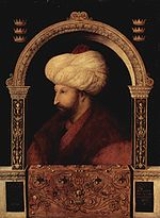
abstract noun meaning "strength", "authority", "rulership", and "dictatorship", derived from the masdar
سلطة , meaning "authority" or "power". Later, it came to be used as the title of certain rulers who claimed almost full sovereignty in practical terms (i.e. the lack of dependence on any higher ruler), without claiming the overall caliphate
, or it was used to refer to a powerful governor
of a province within the caliphate.
The dynasty
and lands ruled by a sultan are referred to as a sultanate .
The title carries moral weight and religious authority, in the Qur'an
.
1218 Al-Kamil becomes Sultan of Egypt, Syria and northern Mesopotamia on the death of his father Al-Adil.
1268 The Principality of Antioch, a crusader state, falls to the Mamluk Sultan Baibars in the Battle of Antioch.
1270 The Eighth Crusade and siege of Tunis end by an agreement between Charles I of Sicily (brother to King Louis IX of France, who had died months earlier) and the sultan of Tunis.
1451 Sultan Mehmed II inherits the throne of the Ottoman Empire.
1453 Fall of Constantinople: Ottoman armies under Sultan Mehmed II Fatih capture Constantinople after a 53-day siege, ending the Byzantine Empire. Although the date of May 29, 1453 is that of the Julian Calendar, the event is commemorated in Istanbul on this day of the present Gregorian calendar.
1713 The ''Kalabalik'' or ''Tumult in Bendery'' results from the Ottoman sultan's order that his unwelcome guest, King Charles XII of Sweden, be seized.
1909 Sultan of Ottoman Empire Abdul Hamid II is overthrown, and is succeeded by his brother, Mehmed V.
1920 The national council in Turkey denounces the government of Sultan Mehmed VI and announces a temporary constitution.
1970 Qaboos ibn Sa’id becomes Sultan of Oman after overthrowing his father, Sa’id ibn Taimur initiating massive reforms ;modernisation programs and end to a decade long civil war.

